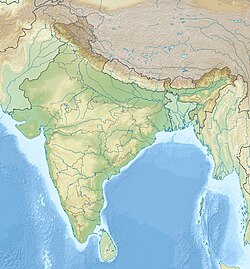Udayagiri, Orissa
| Udayagiri | |
|---|---|
| ଉଦୟଗିରି | |

Main Stupa
|
|
| Basic information | |
| Location | India |
| Geographic coordinates | 20°38′30″N 86°16′09″E / 20.6416°N 86.2692°ECoordinates: 20°38′30″N 86°16′09″E / 20.6416°N 86.2692°E |
| Affiliation | Buddhism |
| State | Odisha |
| Country | India |
| Status | Preserved |
Udayagiri (ଉଦୟଗିରି) is the largest Buddhist complex in the Indian state of Odisha. It is composed of major stupas and monasteries (viharas). Together with the nearby complexes of Lalitgiri and Ratnagiri, it is part of Puspagiri University. The heritage sites are also known collectively as the "Diamond Triangle" of the "Ratnagiri-Udayagiri-Lalitgiri" complex. Per epigraphical artifacts found at the site, its historical name was “Madhavapura Mahavihara.” This Buddhist complex, preceded by the Ratnagiri and Lalitgiri sites, with their monasteries, is believed to have been active between the 7th and the 12th centuries.
Udayagiri is situated in the foothills, 90 kilometres (56 mi) to the north-east from Bhubaneswar, and 70 kilometres (43 mi) north-east of Cuttack in Jajpur district.
Numerous excavations by the Archaeological Survey of India (ASI) have been conducted at Udayagiri since 1958. The Udayagiri Site 1, the first site to be excavated, is in a depression between two valleys. In the excavations done during the period between 1985–86 and 1989–90, at the Udayagiri Site 2, the antiquities exposed consisted of a Buddhist Monastic complex enclosed within a compound wall, including a stupa of 7 metres (23 ft) height with four images of dhyani Buddhas fixed at its four cardinal points. On the basis of the epigraphical evidence archaeologist have inferred that this site is “Madhavapura Mahavihara”. During the large excavation from 1997 to 2000, a second part of Udayagiri-2 was discovered with additional stupas and monasteries. These antiquities consist of two eighth century monastic complexes, statues of Buddha, Tara, Manjusri, Avalokiteśvara, Jatamukuta Lokesvara and many terracotta (earthenware) seals. A stepped stone well with epigraphic inscriptions has also been discovered. Also seen near one of the entry gates at the site is a human figure swinging on a rope, with eyes closed, in a state of perfect happiness. saroh
...
Wikipedia


